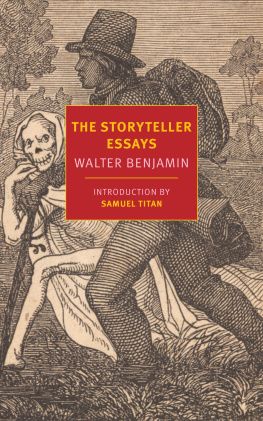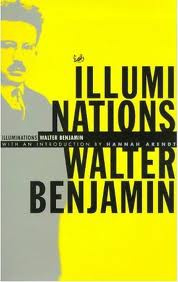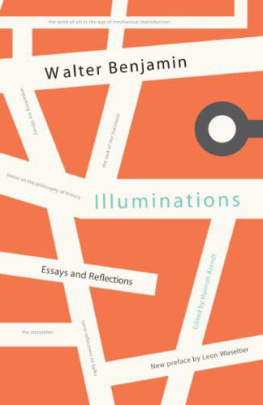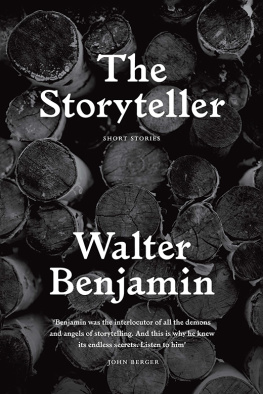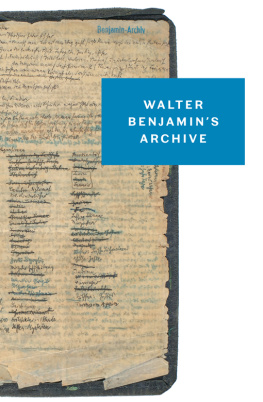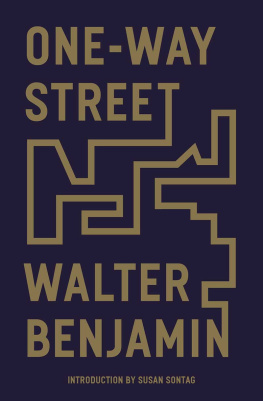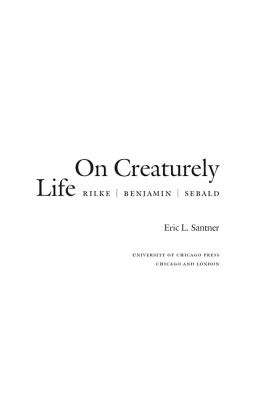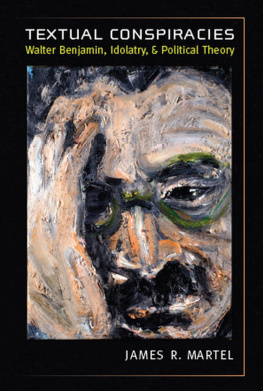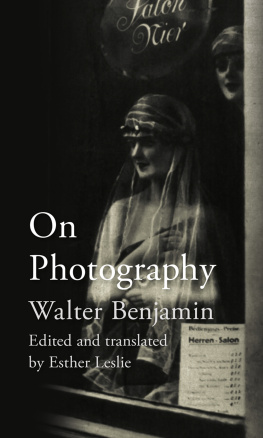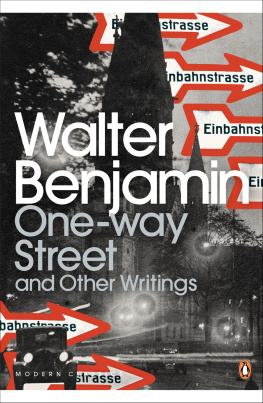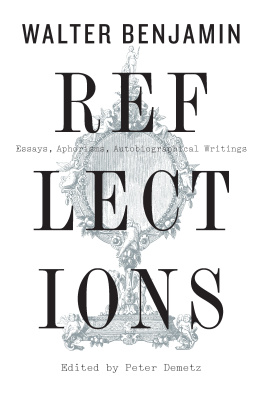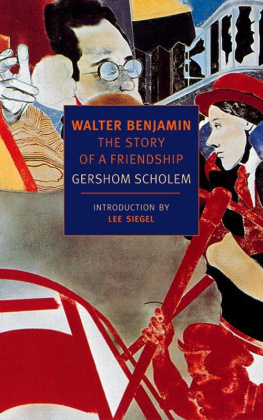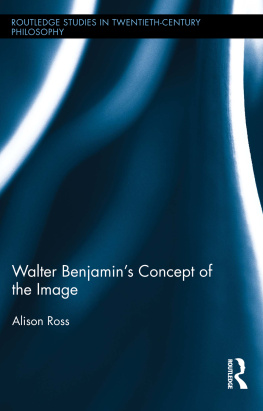Walter Benjamin - The Storyteller Essays
Here you can read online Walter Benjamin - The Storyteller Essays full text of the book (entire story) in english for free. Download pdf and epub, get meaning, cover and reviews about this ebook. year: 2019, publisher: New York Review Books, genre: Detective and thriller. Description of the work, (preface) as well as reviews are available. Best literature library LitArk.com created for fans of good reading and offers a wide selection of genres:
Romance novel
Science fiction
Adventure
Detective
Science
History
Home and family
Prose
Art
Politics
Computer
Non-fiction
Religion
Business
Children
Humor
Choose a favorite category and find really read worthwhile books. Enjoy immersion in the world of imagination, feel the emotions of the characters or learn something new for yourself, make an fascinating discovery.
- Book:The Storyteller Essays
- Author:
- Publisher:New York Review Books
- Genre:
- Year:2019
- Rating:5 / 5
- Favourites:Add to favourites
- Your mark:
- 100
- 1
- 2
- 3
- 4
- 5
The Storyteller Essays: summary, description and annotation
We offer to read an annotation, description, summary or preface (depends on what the author of the book "The Storyteller Essays" wrote himself). If you haven't found the necessary information about the book — write in the comments, we will try to find it.
The Storyteller Essays — read online for free the complete book (whole text) full work
Below is the text of the book, divided by pages. System saving the place of the last page read, allows you to conveniently read the book "The Storyteller Essays" online for free, without having to search again every time where you left off. Put a bookmark, and you can go to the page where you finished reading at any time.
Font size:
Interval:
Bookmark:

WALTER BENJAMIN (18921940) was the oldest of three siblings born to an intellectual Jewish family in Berlin. From 1912 to 1915, he studied philosophy at the Universities of Freiburg, Berlin, and Munich, befriending the young philosopher Gershom Scholem at the latter. In 1917, Benjamin transferred again, to the University of Bern, where he met and married Dora Sophie Kellner; their son, Stefan, was born in 1918. While working on the periphery of the academy, he wrote parables, criticism, and short stories; translated Baudelaires Tableau Parisien and two volumes of Prousts In Search of Lost Time; made major contributions to twentieth-century criticism and thought in essays such as The Task of the Translator, The Work of Art in the Age of Mechanical Reproduction, The Paris of the Second Empire in Baudelaire, and Theses on the Philosophy of History; and worked on his unclassifiable and unfinished Arcades Project. After Hitlers rise to power, Benjamin fled Germany for Ibiza, Nice, and finally, Paris. In 1938 he was arrested and imprisoned in a furniture factory in Burgundy. After his release and the day before the Germans invaded Paris, he and his sister fled to Portbou, on the Spanish border. Carrying a leather suitcase with an unknown manu-script inside, Benjamin made the grueling crossing over the Pyrenees to Spain, where his request for entry was rejected by the local authorities; that night he committed suicide.
SAMUEL TITAN is an editor and translator based in Brazil. He teaches comparative literature at the University of So Paulo.
TESS LEWIS has translated works from the French and German, including books by Peter Handke, Anselm Kiefer, Philippe Jaccottet, and Christine Angot. Her awards include the 2017 PEN Translation Prize and a Guggenheim fellowship. She serves as the co-chair of the PEN Translation Committee and is an advisory editor for The Hudson Review.
THE STORYTELLER ESSAYS
WALTER BENJAMIN
Edited and with an introduction by
SAMUEL TITAN
Translated from the German by
TESS LEWIS
NEW YORK REVIEW BOOKS

New York
THIS IS A NEW YORK REVIEW BOOK
PUBLISHED BY THE NEW YORK REVIEW OF BOOKS
435 Hudson Street, New York, NY 10014
www.nyrb.com
Translation copyright 2019 by Tess Lewis
Introduction copyright 2019 by Samuel Titan
All rights reserved.
Cover image: Lorenz Frlich, Tod und Wandrer (Death and Wanderer), illustration from the Schsischer
Volkskalender for 1848; courtesy Universitts- und Landesbibliothek Dsseldorf
Cover design: Katy Homans
Library of Congress Cataloging-in-Publication Data
Names: Benjamin, Walter, 18921940, author. | Lewis, Tess, translator. | Titan, Samuel, editor, writer of introduction. | Benjamin, Walter, 18921940.
Storytellers.
Title: The storyteller essays / by Walter Benjamin ; trans. by Tess Lewis ; edited and introduction by Samuel Titan.
Other titles: Walter Benjamins Storytellers
Description: New York : New York Review Books, 2019. | Series: New York Review Books classics.
Identifiers: LCCN 2018036771 (print) | LCCN 2018058293 (ebook) | ISBN 9781681370590 (epub) | ISBN 9781681370583 (paperback)
Subjects: LCSH: Benjamin, Walter, 18921940Translations into English. | Benjamin, Walter, 18921940Books and reading. | BISAC: LITERARY COLLECTIONS / Essays. | LITERARY CRITICISM / European / German. | FICTION / Short Stories (single author).
Classification: LCC PT2603.E455 (ebook) | LCC PT2603.E455 A2 2019 (print) | DDC 838/.91209dc 3
LC record available at https://lccn.loc.gov/2018036771
ISBN 978-1-68137-059-0
v1.0
For a complete list of titles, visit www.nyrb.com or write to:
Catalog Requests, NYRB, 435 Hudson Street, New York, NY 10014
B OOKS have their fates, and the same probably applies to essays. The fate of The Storyteller is, in any case, a fine example of just how surprising the career of a text can be. The work of a German Jewish exile trying to scrape together a living after the Nazi takeover in 1933, it purports to discuss the stories of a great but lesser-read Russian writerbut then veers off into a number of other topics. The piece appeared in 1937 in the very last issue of an eccentric Swiss review, which counted a mere thirty-five subscribers at the time. Its author committed suicide three years later, as he fled occupied France, leaving behind a dispersed body of critical work and a formidable mass of unfinished manuscripts. None of this looks like the stuff a success story is made of, and yet Walter Benjamins The Storyteller has become one of the best-known literary essays of the twentieth century. Widely familiar to students of literature, it is also regularly featured on reading lists in fields such as anthropology, media studies, and creative writinga remarkable reversal of fate when one considers the essays obscure beginnings.
Benjamins renown owes much to the loyalty of the likes of Hannah Arendt, Theodor Adorno, and Georges Bataille, to name just a few of those who kept his memory alive after the war. His writings and correspondence were devoutly unearthed, footnoted, and printed in multiple formats, from cheap paperbacks for undergraduates to multivolume hardbound editions of his complete writings, both in German and in translation. Right now, Suhrkamp Verlag, Benjamins publisher in his homeland, is halfway through its second take on his complete works, a densely annotated critical edition quite reminiscent of classical scholarship. Given that, why another collection of his essaysand, more to the point, why one like this, centered on The Storyteller?
The answer has to do exactly with the popularity of the essay, which all too often is presented as a stand-alone text, a brilliant piece of literary theory, or a poetic exercise in historical nostalgia that the reader can appreciate without, say, having to tackle Benjamins dense dissertation Origin of the German Trauerspiel or getting lost in the maze of his unfinished Arcades Project. The fluent prose of The Storyteller, full of memorable formulations and striking images, tends to confirm this preconception, and indeed the essay seems to have taken shape unusually easily for Benjamin. Begun around late March 1936, it was probably finished by June, though it was only in the summer of the following year that it came out in Fritz Liebs review Orient und Occidentquick work indeed when compared to the tortuous genesis of some of Benjamins other major essays.
The essay and its origins are, however, more complicated than this would suggest. The Storyteller was the outcome of a long train of thought that goes back to Benjamins student days in Berlin and gathers momentum in the second half of the 1920s. From 1926 to 1936, he published a number of piecesessays, newspaper articles, book reviews, short stories, etc.in which he tested concepts and probed images and observations that would finally converge in his critical portrait of Nikolai Leskov. The Storyteller Essays puts The Storyteller in the company of these texts, the better to chart the development of Benjamins thoughts about three key concepts in the 1936 essay: experience, tradition, and storytelling. Read in the company of its forerunners, one can hear how The Storyteller resonates with his larger themes and recognize its place at the heart of his oeuvre, next to The Work of Art in the Age of Mechanical Reproduction and the Baudelaire essays of the 1930s. Last but not least, this volume offers a revealing glimpse of the dynamics of Benjamins writing: the way he tries out an idea in one context only to take it up againsometimes quoting himself verbatimin quite another; his manner of smuggling ideas from authors like Michel de Montaigne or Paul Valry to reflect his own, different concerns; and his gift for aphorismsphrases that he would sometimes polish over the course of years (for example, Boredom is the dream bird that broods the egg of experience)but equally for jarringly abrupt, montage-like transitions.
Font size:
Interval:
Bookmark:
Similar books «The Storyteller Essays»
Look at similar books to The Storyteller Essays. We have selected literature similar in name and meaning in the hope of providing readers with more options to find new, interesting, not yet read works.
Discussion, reviews of the book The Storyteller Essays and just readers' own opinions. Leave your comments, write what you think about the work, its meaning or the main characters. Specify what exactly you liked and what you didn't like, and why you think so.

